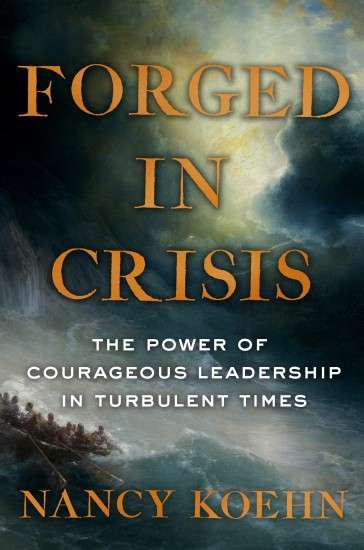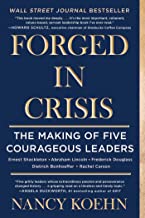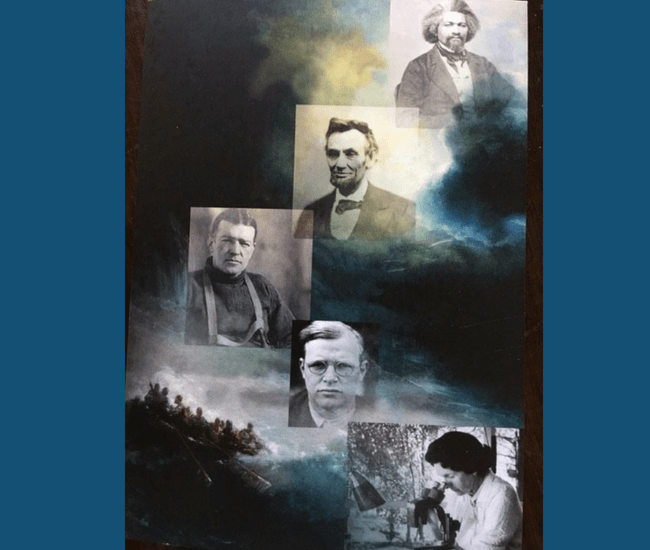Forged in Crisis by Nancy Koehn
There are so many books on leadership it may seem there are no more “secrets” of leadership to be revealed to us. So for anyone writing on the subject, the challenge is: (1) make the subject more interesting, more vivid, and (2) give the reader the realistic reassurance that, yes, maybe I, too, can be a leader. In this, Nancy Koehn admirably succeeds in her work, Forged in Crisis: The Making of Five Courageous Leaders (Scribner).
Koehn, a professor and historian at the Harvard Business School where she holds the James E. Robison chair of Business Administration, writes a historical narrative of five extraordinary people who mastered a crisis in order to prevail and became great leaders in the process: polar explorer Ernest Shackleton marooned on an Antarctic ice floe; Abraham Lincoln on the verge of seeing the Union collapse; escaped slave Frederick Douglass facing possible capture; Nazi-resisting clergyman Dietrich Bonhoeffer agonizing over how to counter absolute evil with faith; and environmental crusader Rachel Carson racing against clock – and the cancer ravaging her — in a bid to save the planet.
The narrative reaches back to their childhoods to show them growing into the persons they will ultimately become.
Koehn shows that while they had ambition, at a certain point ambition becomes less important. “As each discovered a larger purpose and embraced it, each found his or her impetus, and the validation in the mission itself,” she writes. Cultivating an emotional awareness, they used this to access their stronger selves, to make something positive happen in the world. Emotionally penetrable, they used every crisis as an opportunity for personal growth, and they led from their humanity, using their empathy to help motivate and sustain others.
Not surprisingly, what each learned in a crisis was the value of resiliency. True grit. Even if they didn’t see a way out, they resolved not to falter. They had passion, perseverance. And they were able to step back, observe carefully and see the big picture even if, at the moment, they couldn’t act on their vision.
What is surprising – perhaps a “secret” of leadership hitherto unrevealed: “At times, doing nothing at all was the best action each of these leaders could take,” Koehn says. She shows how Lincoln, especially, refused to be goaded into “taking precipitate action that might compromise his larger mission.” Another of Koehn’s insights is that these five had the power of writing and writing well — and at length. She urges today’s leaders to consider that “perhaps e-mail, text messages, and Twitter posts aren’t enough.”
Koehn so convincingly captures the anguish and urgency that these five experienced and employs such vivid detail to show how they found the inner strength, power and courage to lead that she has little need to set up the straw man that leaders are born, not made, and little need to remind us that charisma and aggressiveness aren’t essential to leadership.
Of course this fits very well with what we want to hear: Even if we lack charisma and aggressiveness, even if we are not born leaders, we can make ourselves into one. And Koehn encourages us with the reminder that while this is perilous, compelling and exhaustive work, it is also some of the most satisfying work we can do.
Koehn cites David Foster Wallace, author of Infinite Jest, writing how the word leader has become such a boring cliché that our eyes glaze over when we see it, which is weird, says Wallace, because “when you come across somebody who actually is a real leader…he is the opposite of boring.”
Similarly, Koehn’s book about boring, 10 years in the writing, is the opposite of boring. Emotionally gripping, with the pull of a great novel and sparkling with epiphanies, Forged in Crisis challenges each of us to forge ourselves into a courageous leader. As Nancy Koehn says, our world sorely needs them.
Buy this Book!
Amazon



